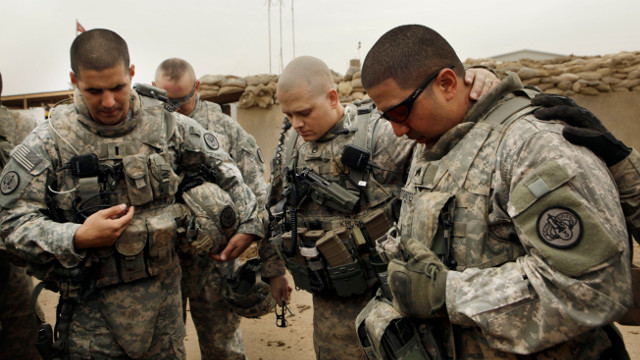
In this Tuesday, Jan. 25, 2011 file photo, U.S. Army Lt. Daniel McCord, left, Staff Sgt. Marc Krugh, center and Sgt. Christopher Torrentes, right, from the 3rd Armored Cavalry Regiment pray before heading out on a patrol at Contingency Operating Site Kalsu, south of Baghdad, Iraq. (AP Photo/Maya Alleruzzo, File)
In my year in Iraq, I lost track of how many times my guys asked me why so many Iraqis viewed us with distrust when we were trying to help them. The question would arise while we were walking the beat with Iraqi police officers, manning checkpoints, or in our forward operating base after we went off-duty.
Invariably, my response went something like this: “Imagine that you’re back home, OK? Suddenly, you got a whole mess of Iraqi soldiers in your town. They’re all over the place, doing the same things we’re doing right now. How do you think you’d react? You’d probably get pretty hot, right?”
The notion that my illustration would become anything other than that scarcely crossed my mind. Yet, here we are in August of 2014, 10 years after I got back from Iraq, and the police agencies that have patrolled the streets of Ferguson, Missouri — until they were relieved of duty on Thursday amid public outrage over their heavy-handed tactics — have the kind of armor and weaponry that my men and I would have envied in the performance of our duties in an actual combat zone.
Let me repeat that: the police in Ferguson have better armor and weaponry than my men and I did in the middle of a war. And Ferguson isn’t alone — police departments across the US are armed for war.
The gear and weaponry worn by police officers in Ferguson aren’t just clothing and tools. They’re meant to accomplish certain tasks, and they will elicit certain responses from the people who encounter them. When my men and I donned our helmets and body armor, and carried our weapons out on patrol, we were at war. Our gear wasn’t just protective, it was meant to be downright unwelcoming. That was the point — it’s combat gear, not a costume you wear to look “tactical.”
But it goes beyond that. Nearly 40 years ago, Leonard Berkowitz and Anthony LePage conducted the first study aiming to demonstrate something called “the weapons effect.” As Berkowitz pithily said, “Guns not only permit violence, they can stimulate it as well. The finger pulls the trigger, but the trigger may also be pulling the finger.”
There’s truth in those words. I distinctly recall, even now, the small jolt of energy that ran through my body as I readied my weapon, put on my body armor and settled my helmet upon my head. Part of it was anxiety; nothing tenses you up more than not knowing where danger lies. Part of it, though, was anticipation; the motivation needed to face danger, and perhaps death, squarely in the eye. I remember the deep breaths I took to settle my spirits, but it was hard not to swagger a little bit while walking. I recollect that fraction of my soul making my eyes dart around, seeking out anyone who would challenge my authority.
That’s when the discipline and all those countless hours of training kicked in. Military discipline hones you to a point where you can acknowledge fear, yet not give in to it. That’s the difference between taking control of a dangerous situation — and lessening tensions; or losing control of the situation, and creating an even bigger disaster.
It’s that kind of training and discipline that’s been markedly absent from everything we saw this week in Ferguson. We saw police officers pointing weapons at civilians, firing their “less than lethal” ammunition in wild abandon, and posing ostentatiously on armored vehicles. I contrast those images with the photos I took of myself in Iraq; helmet off, smiling towards the camera, my weapon within easy reach but never in the frame. I count on one hand the number of times I raised my weapon in order to use it, and my ears still ring with the tongue-lashing my first sergeant delivered to a lieutenant whose weapon went off accidentally.
That’s how seriously we take this stuff in the military. It certainly doesn’t look like the police in Ferguson took it that seriously. And that matters, because it made a bad situation utterly disastrous.
Our rules of engagement (ROE) — the instructions for how to deal with enemy forces, never mind Iraqi civilians — were far more restrictive than what we’re seeing from the police in Ferguson. Primary among them: Treat all civilians and their property with respect and dignity.
This was drilled into our heads even before we left for Iraq. We were all issued “culture smart cards” intended to help us deal with Iraqi civilians. These cards — I still have mine — contained tips like, “Appear relaxed and friendly; social interaction is critical in building trust,” and “Be gracious; do not appear anxious to leave.”
We’ve seen a lot of things from the police response in Ferguson, but respect and dignity for the people living there aren’t among them. That lack of respect for civilians only serves to inflame the situation even more, and to me, at least, is indicative of a lack of discipline and professionalism.
There is no need to bring this level of militarization — or any level, really — to deal with what have been largely peaceful protests. One of the things we learned while we trained in crowd control techniques was that our mere presence could make an already-tense situation much more difficult. The emphasis, therefore, was on finding ways to de-escalate the situation in whatever manner we could, as quickly as possible.
This meant that we handled much more dangerous situations in Samarra, Balad, and Kirkuk with far less violence than we’ve seen from the police over the last few days. Our training emphasized the prevention of confrontation and violence, rather than exacerbating it. From “Civil Disturbances (ATP 3-39.33)”, the Army’s crowd control manual (PDF):
Winning in this environment is not like winning in combat. US forces may appear to be invincible and formidable, but they risk being portrayed as oppressors. Thus, US forces can lose by appearing to win. Winning in this environment is about seizing and holding the moral high ground. US forces must maintain the authority and legitimacy of what they are doing.
I look at the police in Ferguson, and all I can do is shake my head. If the primary goal of the police was to win the trust of local citizens in order to calm the roiling waters caused by the murder of Mike Brown, then they have utterly failed in accomplishing that goal.
The views expressed in this post are the author’s alone, and presented here to offer a variety of perspectives to our readers.


